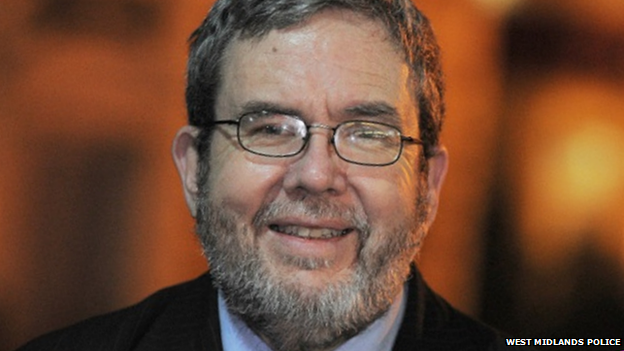Will PCC poll be a by-election or a referendum?
- Published
- comments

Will people go to the polls to choose a new police and crime commissioner in August?
If you want to demonstrate just how low turnouts in public elections are capable of plummeting, you could do no better than to plan a poll to choose a police and crime commissioner (PCC) during the dog days of summer: Thursday 21 August to be precise.
Especially in the West Midlands where the numbers in the original PCC elections in November 2012 were the second lowest anywhere in England and Wales. Just 12%of the two million people eligible to vote in the police force area actually did so. In some areas only one person in 20 took the trouble.
Following the untimely death in July of the region's first PCC, former Wolverhampton Labour Councillor Bob Jones, this is bound to be seen not just as a by-election to replace him but also as a referendum on the role itself.
He certainly disapproved of the job despite his obvious determination to make the best of it. And, following a party commission of inquiry, an incoming Labour government would be expected to scrap PCCs altogether.

Bob Jones, who died in July, was the West Midlands PCC despite disapproving of the government-created role.
But the original "Big Idea" set out by ministers when they first proposed PCCs was to establish a high-profile heavy-hitter in each force area as a focal point to make policing more directly accountable to the public.

David Jamieson, Labour; Les Jones, Conservative; Keith Rowe, UKIP; Ayoub Khan, Liberal Democrats
Home Secretary Theresa May singled out the West Midlands as an example of how the former police authorities, eventually replaced by PCCs, had become "invisible and ineffective", notably after the summer riots of 2011 when she she said the West Midlands body had been nowhere to be seen.
So the irony was lost on no one that this radical departure, billed as an opportunity for voters to have more democratic clout, should produce such a display of public apathy. The government took the flak for generally failing to deliver an effective lead from the top and for its decision to veto, on cost grounds, free postal distribution of candidates' literature to publicise new-fangled elections in large and unfamiliar electoral areas.
Amid renewed concerns about the political mandate and democratic legitimacy of the incoming commissioner, the government has rushed though legislation guaranteeing that all four candidates will now be able to have their campaign leaflets posted to every household in the area. This time the taxpayer will foot the £700,000 bill for delivering them.
'Indecent haste'
One other measure which might also have eased those fears of an even more embarrassing turnout could have been to hold the by-election later, after the end of the school holidays in September. I understand most of the parties would have welcomed a delay, not just to allow voters to return from the beach but also out of respect for Bob Jones himself. But two local voters, including the UKIP activist Mike Rumble, formally requested a poll even before Mr Jones's funeral.
Mr Jones's family said they felt insulted and accused the two of indecent haste. But under electoral law the move triggered a thirty-five day election period culminating in polling on the third Thursday in August.
This has done nothing to quell suspicions, hotly denied by UKIP, that its eagerness for an early poll is tantamount to an admission that its support peaked in the European elections and is now set to fall like autumn leaves.
In the absence of the coverage that attended UKIP's every move during the earlier months of this year, this looks more like Labour's election to lose.
For a start, as an electoral process, it is about as different to the European elections as it could possibly be. When Bob Jones was elected, he secured no fewer than 42 per cent of the first preference votes with his Conservative challenger 23 per cent behind. In the run-off, he received 60 per cent of all the valid second preference votes cast.
'Eager hopefuls?'
As for the candidates themselves, I understand there has not exactly been a stampede of eager hopefuls looking to serve-out the remaining two years of the term of office. Not even with the job's £100,000-a-year salary!
The candidates selected to try to breathe new life into the contest all have local credentials.
David Jamieson (Labour) grew up in Solihull and, as MP for Plymouth Devonport, was a transport minister in the last Labour government
Les Jones (Conservative) has lived and worked in the West Midlands virtually all his life and is a member, and former leader, of Dudley Metropolitan Council
Ayoub Khan (Liberal Democrat) is a barrister and a former member of Birmingham City Council
Keith Rowe (UKIP) is his party's main spokesman in Birmingham, where he is a prominent member of the city's small business community.
One final question remains:
Does all this talk of public apathy run the risk of becoming a self-fulfilling prophecy? Committed democrats instinctively prefer high turnouts to low ones of course. But aren't there times when stayaway voters can speak just as eloquently as those who turn out?
Which leads us back to where we began, with what will inevitably be seen as a referendum as much as an election.